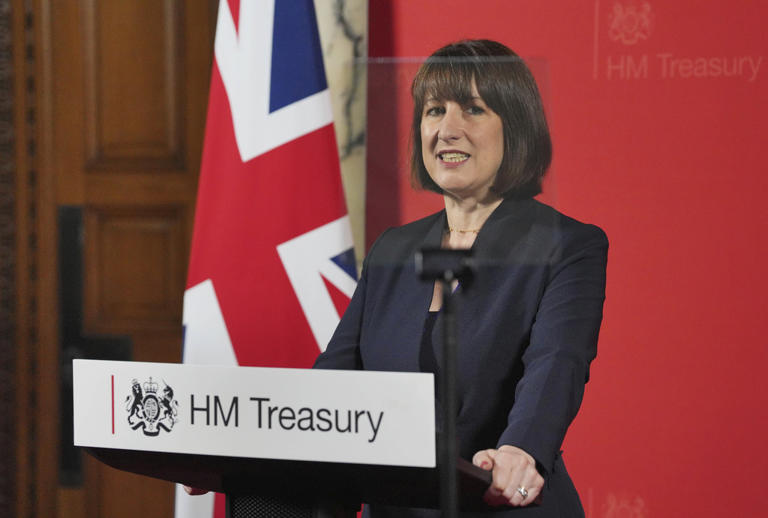In a dramatic overhaul of the UK’s financial strategy, the newly elected Labour government has announced a series of sweeping fiscal measures to address a newly uncovered £22 billion ($28 billion) shortfall in public finances. This substantial gap, which the Labour administration inherited from the previous Conservative government, has led to immediate and impactful changes in government spending and policy. Rachel Reeves, who has recently taken on the role of Treasury chief, made these announcements in her inaugural major speech, shedding light on the financial challenges and her plans to manage them.
Key Fiscal Measures and Project Cancellations
Rachel Reeves, now the U.K.’s first female Chancellor of the Exchequer, has laid out a comprehensive plan to address the fiscal shortfall. Her speech highlighted several significant sources of excess spending that have contributed to the deficit. One of the major issues identified was a £6.4 billion overspend in the asylum system, linked in part to the failed plan of deporting migrants to Rwanda. Additionally, the audit revealed that the costs associated with the ongoing conflict in Ukraine had not been fully accounted for in previous budgets. Another critical issue was the failure to properly budget for upcoming public sector pay awards, which added to the financial strain.
To mitigate the impact of this shortfall, Reeves has announced the cancellation of several planned projects and initiatives. Notable among these is the scrapping of a controversial transportation project involving a tunnel near Stonehenge, which had faced significant opposition. Additionally, the previous government’s ambitious new hospital program will be discontinued. Instead, a new, more realistic, and costed timetable for hospital delivery will be established. This move aims to ensure that public health infrastructure projects are both feasible and financially sustainable.
Perhaps the most contentious decision announced was the alteration of winter fuel payments. Previously, these payments were provided to all retirees to assist with heating costs during the winter months. Under the new plan, this support will be restricted to those retirees deemed most in need. This change aims to target resources more effectively, but it has drawn criticism for potentially reducing support for those who may still be struggling.
Implications for Taxation and Spending
Reeves has indicated that her upcoming budget, which is set to be unveiled on October 30, will involve “difficult decisions” regarding taxation, spending, and welfare policies. Despite Labour’s campaign promises not to raise taxes on working individuals, the looming fiscal shortfall may compel the government to consider tax increases or other revenue-generating measures. Possible areas for generating additional revenue include closing tax loopholes, particularly those related to capital gains and inheritance taxes.
Critics of the Labour government, including Jeremy Hunt, the former Chancellor, have accused Reeves of using the financial shortfall to justify future tax increases and to position herself politically. Hunt has argued that Reeves’ criticisms of the previous administration are an attempt to deflect attention from her own handling of the fiscal challenges. He has also suggested that she should have been more transparent about potential tax hikes during the election campaign.
Public Sector Pay Agreements
In addition to the fiscal adjustments and project cancellations, Reeves has negotiated new pay agreements for public sector workers. One of the most significant outcomes of these negotiations is a 22% pay increase for junior doctors in England over the next two years. This agreement is designed to address and resolve a protracted strike involving junior doctors and is part of a broader effort to improve compensation for various public sector staff, including teachers and healthcare professionals.
Reactions from Economic Analysts
The Institute for Fiscal Studies (IFS), a respected economic think tank, has supported Reeves’ assessment of the financial situation. IFS Director Paul Johnson acknowledged that the scale of the financial challenges faced by the new government was even greater than anticipated. He noted that the spending plans inherited from the previous administration were incompatible with Labour’s ambitions for public services and that additional funding would have been required eventually. The IFS’s analysis corroborates Reeves’ claims and highlights the severity of the fiscal situation that the Labour government is working to address.
In summary, the new Labour government’s fiscal strategy represents a significant shift in the UK’s economic policy landscape. By addressing the £22 billion shortfall through project cancellations, changes to winter fuel payments, and potential tax adjustments, the government aims to stabilize the public finances and lay the groundwork for sustainable economic policies moving forward.
